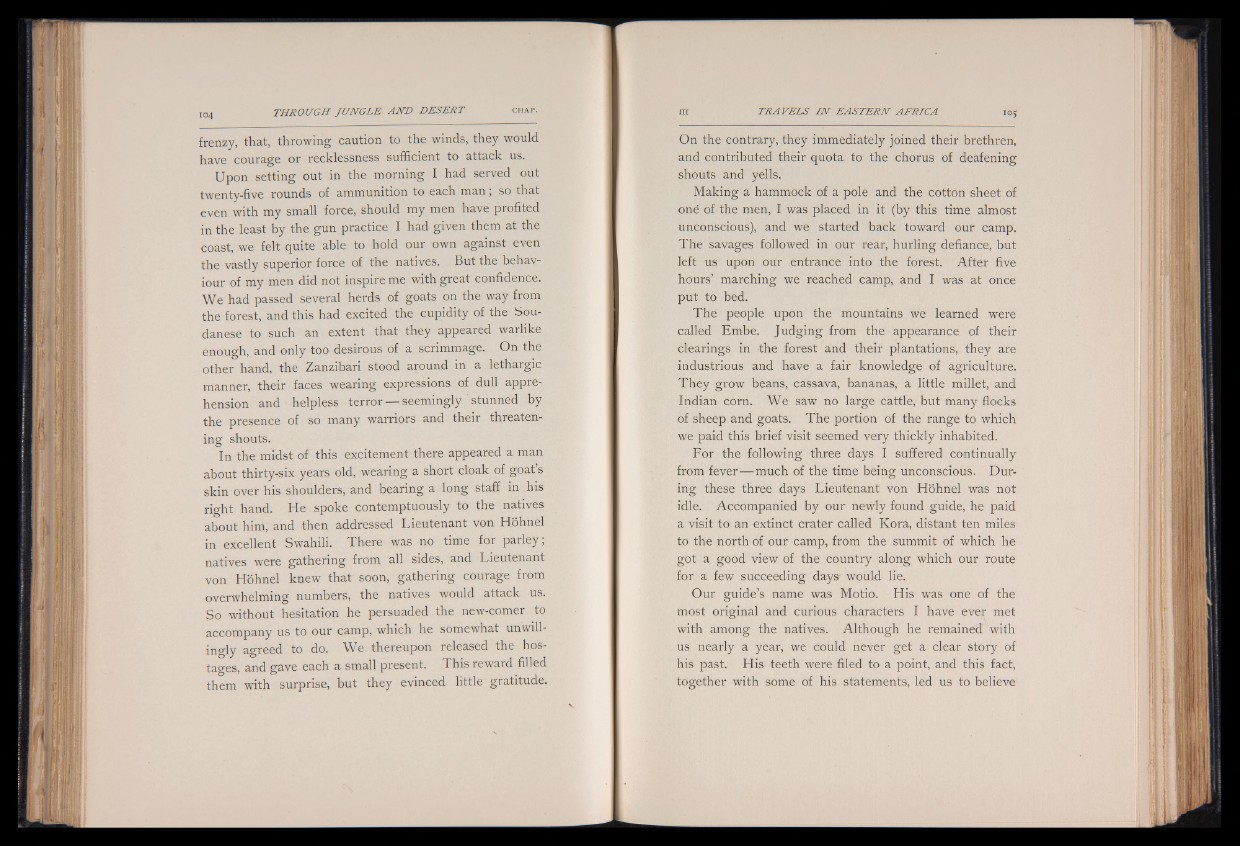
frenzy, that, throwing caution to the winds, they would
have courage or recklessness sufficient to attack us.
Upon setting out in the morning I had served out
twenty-five rounds of ammunition to each man; so that
even with my small force, should my men have profited
in the least by the gun practice I had given them at the
coast, we felt quite able to hold our own against even
the vastly superior force of the natives. But the behaviour
of my men did not inspire me with great confidence.
We had passed several herds of goats on the way from
the forest, and this had excited the cupidity of the Soudanese
to such an extent that they appeared warlike
enough, and only too desirous of a scrimmage. On the
other hand, the Zanzibari stood around in a lethargic
manner, their faces wearing expressions of dull apprehension
and helpless terror — seemingly stunned by
the presence of so many warriors and their threatening
shouts.
In the midst of this excitement there appeared a man
about thirty-six years old, wearing a short cloak of goat’s
skin over his shoulders, and bearing a long staff in his
right hand. He spoke contemptuously to the natives
about him, and then addressed Lieutenant von Hohnel
in excellent Swahili. There was no time for parley;
natives were gathering from all sides, and Lieutenant
von Hohnel knew that soon, gathering courage from
overwhelming numbers, the natives would attack us.
So without hesitation he persuaded the new-comer to
accompany us to our camp, which he somewhat unwillingly
agreed to do. We thereupon released the hostages,
and gave each a small present. This reward filled
them with surprise, but they evinced little gratitude.
On the contrary, they immediately joined their brethren,
and contributed their quota to the chorus of deafening
shouts and yells.
Making a hammock of a pole and the cotton sheet of
one of the men, I was placed in it (by this time almost
unconscious), and we started back toward our camp.
The savages followed in our rear, hurling defiance, but
left us upon our entrance into the forest. After five
hours’ marching we reached camp, and I was at once
put to bed.
The people upon the mountains we learned were
called Embe. Judging from the appearance of their
clearings in the forest and their plantations, they are
industrious and have a fair knowledge of agriculture.
They grow beans, cassava, bananas, a little millet, and
Indian corn. We saw no large cattle, but many flocks
of sheep and goats. The portion of the range to which
we paid this brief visit seemed very thickly inhabited.
For the following three days I suffered continually
from fever— much of the time being unconscious. During
these three days Lieutenant von Hohnel was not
idle. Accompanied by our newly found guide, he paid
a visit to an extinct crater called Kora, distant ten miles
to the north of our camp, from the summit of which he
got a good view of the country along which our route
for a few succeeding days- would lie.
Our guide’s name was Motio. His was one of the
most original and curious characters I have ever met
with among the natives. Although he remained with
us nearly a year, we could never get a clear story of
his past. His teeth were filed to a point, and this fact,
together with some of his statements, led us to believe